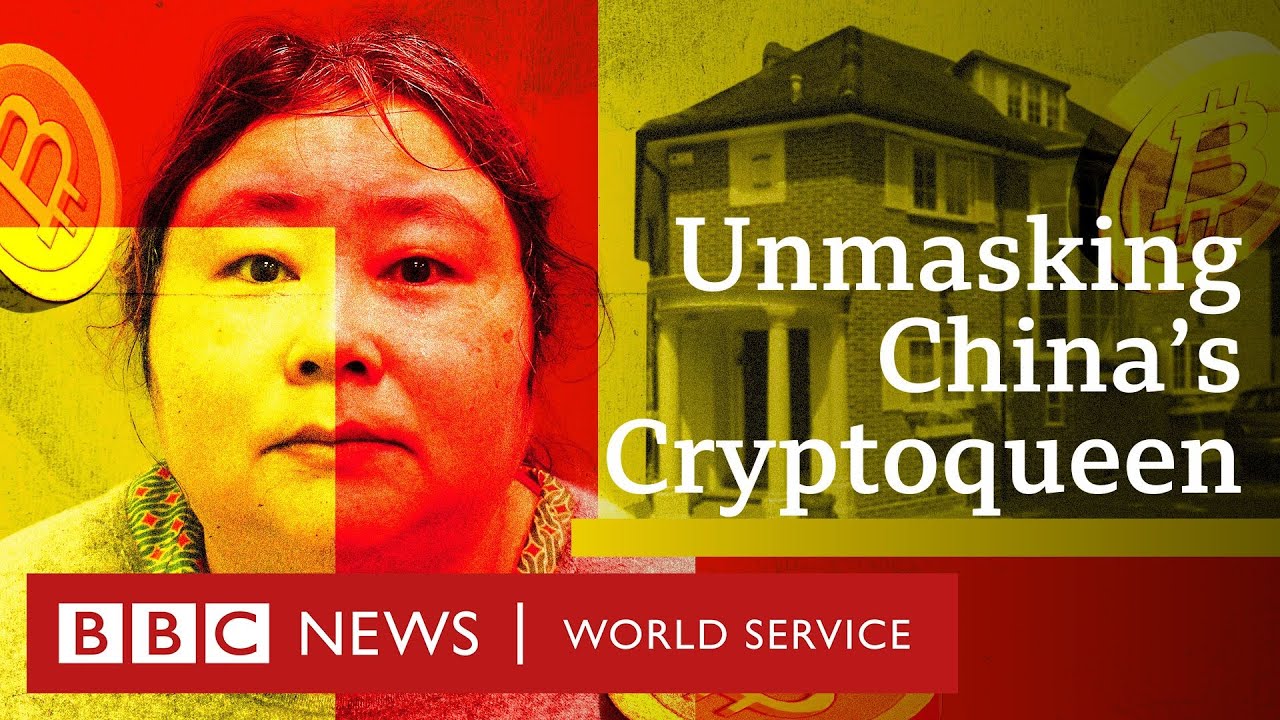Video
2026 Maybach Mythos SL: Dream Car or Financial Madness?

2026 Mercedes-Maybach Mythos SL
This is not just a car — it’s a statement of wealth.
Handcrafted luxury, extreme exclusivity, and a price tag that only the elite can afford.
The real question is: is this ultimate luxury, or pure financial madness?
Would you buy it if money wasn’t a problem?
Follow for more ultra-luxury car shorts
source
Video
Unmasking China’s Cryptoqueen: Behind Britain’s biggest bitcoin seizure – BBC World Service Docs

This is the story behind Britain’s biggest ever seizure of cryptocurrency.
Click here to subscribe to our channel 👉🏽 https://bbc.in/3VyyriM
Between 2014 and 2017, thousands of ordinary Chinese people handed their money over to an investment company that promised them fabulous riches. That vision collapsed when the shadowy figure behind it, Qian Zhimin, fled to the UK with a Bitcoin stash bought with their money.
#BBCEye Investigations speaks to victims and the UK police to find out how the scheme worked, how Qian was caught and what will happen to the huge haul of Bitcoin seized from her.
00:00 Qian Zhimin: The Chinese cryptoqueen
00:44 The scam that reached every province in China
03:22 Qian escapes China for the UK
06:32 A dream of becoming queen of Liberland
10:20 What will happen to the bitcoin worth billions of pounds?
🚨 UPDATE 11/11/25: Cryptoqueen who fled China for London mansion jailed over £5bn Bitcoin stash: https://www.bbc.co.uk/news/articles/cvg4w1g9ezko
🎞️ Watch more investigative journalism from our award-winning BBC Eye investigations team at this documentary playlist: https://www.youtube.com/playlist?list=PLz_B0PFGIn4fa8LK1lptsvoA_spfJhzda
🎧 Listen to The Documentary podcast “The Chinese Cryptoqueen” here: hhttps://www.bbc.co.uk/sounds/play/w3ct8vcl
You may also be interested in these documentaries:
📽️ https://youtu.be/GaYSEWlHrGw
📽️ https://youtu.be/FTnTToWEHvI
📽️ https://youtu.be/dtv_1eafJn4
—————-
This is the official BBC World Service YouTube channel.
If you like what we do, you can also find us here:
Instagram 👉🏽 https://www.instagram.com/bbcworldservice
Twitter 👉🏽 https://twitter.com/bbcworldservice
Facebook 👉🏽 https://facebook.com/bbcworldservice
BBC World Service website 👉🏽 https://www.bbc.co.uk/worldserviceradio
Thanks for watching and subscribing!
#BBCEye #China #Cryptoqueen #Cryptocurrency #Bitcoin #CryptoNews #Documentary #BBCWorldService #WorldService
source
Video
6 Financial Tips for 2025 in Telugu – How to do Financial Planning? | Money Management Tips |Kowshik

Buy a Term Plan & Get Online Discounts Up to 10%👇
https://tinyurl.com/r3sk8mpx
Buy a Health Plan & Get Online Discounts Up to 25%👇
https://tinyurl.com/5358pnpn
🚀 Discover 500+ Courses with a free AI Chatbot 🤖
Subscription Starting @ ₹399/month, Cancel Anytime 🔄 – https://ffdm.app/9qMD
📚 Related Courses 📚
🔥 Get up to 50% off on
➡️Stock Market Course📈 – https://ffdm.app/MbJY
➡️Mutual Funds Course📈 – https://ffdm.app/SLup
➡️Course on Credit Card💳 – https://ffdm.app/qhtn
➡️Credit Score Course📊 – https://ffdm.app/nneZ
➡️Financial Freedom Course💰 – https://ffdm.app/H5Ap
🔰Connect on Telegram – https://t.me/financialfreedomapp
🔰Connect on Whatsapp – https://whatsapp.com/channel/0029VaZmS6mE50Uk32jwqw0k
00:01 – Introduction💰
00:40 – Write your goal & place it nearby. ✍️🎯
01:45 – Work hard for your financial goals. 💪🏽💡
02:21 – Create a second income source. 💼💵
03:24 – Grow investments through funds & stocks. 📈
05:01 – Avoid negative influences. 🚫
06:02 – Good friends help better choices. 👬💼
07:45 – Create a second income. 🔑💵
09:13 – Budget needs, not desires. 💵✋
09:53 – Prepare a shopping list. 📝🛒
11:58 – Start investing in mutual funds. 💹
12:26 – Build an emergency fund. 💼💵
15:49 – Low age = cheaper premiums 🏷️💸
16:20 – Health insurance covers hospital bills 🏥💳
18:48 – Term insurance secures your family 💼👨👩👧👦
19:18 – Insurance ensures family’s future 💖💸
19:43 – Easily compare insurances on Policy Bazaar 🔄💻
21:12 – Avoid high-interest loan apps 🚨💸
22:39 – conclusion
Hope this helps!
6 Financial Tips for 2025 in Telugu | How to do Financial Planning? | Money Management Tips
Learn the 6 essential financial tips for 2025 in Telugu to effectively manage your money and plan for the future. This video covers budgeting, investing, wealth management, and personal finance strategies tailored for beginners. Secure your financial future with these smart tips and achieve financial freedom in 2025!
#financialtips #moneytips #2025finance #personalfinance #financialplanning #financialfreedom #wealthmanagement #budgetingtips #investing #moneygame #financialgrowth #financialliteracy #financialsecurity #financialadvice
DISCLAIMER
We are not SEBI Registered and this video is for educational purposes only and should not be considered as financial advice or an endorsement of specific investments. It is essential to conduct thorough research before making any investment decisions.
source
Video
BITCOIN CRASH: MY $100 MILLION TRADE STARTED!

Bitcoin what now
https://levex.com/r/MMCrypto (sign up FREE & Follow to see my Trade live)
source
Video
Drawdown Demystified: How to Make Your Money Last | Rebel Finance School 2025 Bonus 1 of 5

Welcome to a UK-specific bonus session of our Rebel Finance School course, by Katie & Alan Donegan, featuring special guest John Buston. In this video, we address a critical element of financial planning – how to safely and efficiently withdraw money from your portfolio to fund your retirement. Learn how to live off your investments confidently, covering tax-free lump sums, the most tax-efficient withdrawal order, and how to get free money from the government.
Join us as we guide you through the essentials of drawdown strategy, ensuring you can enjoy your retirement without running out of money.
Key Topics Covered:
– Whether to take tax-free lump sums when retiring
– The most tax-efficient order for withdrawing from your accounts
– How to draw money from your portfolio to live comfortably
– Strategies for getting free money from the government
By the end of this session, you will begin to:
– Understand whether tax-free lump sums are right for your retirement plan
– Know the optimal order to withdraw from accounts to minimise taxes
– Be equipped to live off your portfolio with a sustainable drawdown strategy
– Master the 4% rule and its practical application for financial security
This bonus session could be the key to living your dream retirement with peace of mind!
This video is a bonus session accompanying our 10-week course called Rebel Finance School. For access to the notes, spreadsheets, and more that accompany the course, please sign up here – http://www.rebelfinanceschool.com
Links mentioned
Why confusion is great! https://rebeldonegans.com/confused-good-youre-nearly-there/
How much will you need in retirement? https://retirementlivingstandards.org.uk/
Week 10 of the Rebel Finance School course which covers Sequence of Returns Risk in detail:
UK life expectancy calculator: https://www.ons.gov.uk/peoplepopulationandcommunity/healthandsocialcare/healthandlifeexpectancies/articles/lifeexpectancycalculator/2019-06-07
Bridging calculator: https://rebeldonegans.com/bridging-calculator/
John’s retirement planner: https://tinyurl.com/RetirementAgePlanner
Forecasting workshop: https://www.youtube.com/watch?v=pEsdqMdX3d0
John’s flowcharts for drawdown planning: https://tinyurl.com/DrawdownFlowchartsV4
Come Live to the bonus sessions: https://rebeldonegans.com/events/list/
Watch the bonus sessions on catchup through the RFS YouTube playlist: https://www.youtube.com/watch?v=VPwQcRQbEIo&list=PLRjwfVU_qq2ZyjD8p0gh15L-zPZI2WzL1
Join the Facebook group to get friendly support from like-minded people: https://www.facebook.com/groups/rebelfinance
Disclaimer: We are not financial advisers 💼 This is not financial advice 💰. We are not regulated. We are not trained financial advisors 🎓 We are never going to try and sell you any investments 🛍️ You make your decisions 💭 Sharing our opinions and ideas 💡 These ideas may not continue to work for us or for you. You are 100% responsible for your financial future 💸 There are no guarantees here. For our full disclaimer, please visit: https://rebeldonegans.com/about-us/disclaimers/
#DrawdownStrategy #RetirementIncome #FinancialFreedom #RebelFinanceSchool #PersonalFinance #FinancialLiteracy
source
Video
Printing $1,000,000 of FAKE MONEY in Roblox…

Join My Roblox Group!
https://www.roblox.com/groups/33043362/The-Techy-ARMY#!/about
Socials: https://solo.to/techys
#Roblox
source
Video
He Treats His Wife Like A Pet | Financial Audit

▶ *GET YOUR OWN HAMMER FINANCIAL SCORE* – Want to see where you stack against our guest? Get your free Hammer Financial Score: https://www.calebhammer.com
▶ *FREE TRIAL* To make our classes and budgeting app *more affordable*, we bundled them together for an *80% DISCOUNT* and for this month only, you can try DollarWise Central for *free* – check it out here and change your life: https://dollarwise.com/dollarwise-central/
▶▶ Idk if she needed a break or what, but she *took the gloves off* in the post-show and confronted the f*ck out of him!!! Watch the post-show here: https://www.youtube.com/channel/UCLe_q9axMaeTbjN0hy1Z9xA/join
▶▶▶Download the *DollarWise Budgeting App* today: *Apple:* https://apple.co/4iChGhr *Google Play:* https://bit.ly/sb-googleplay Don’t overcomplicate this crap! All you need is an automated / SIMPLE budget.
▶▶▶▶ *AND REMEMBER* those who sign up for DollarWise Premium *annual* get a signed version of the Cook Book, just submit proof of purchase here: https://tally.so/r/3xzPq5
Use Yrefy to refinance your private student loans today at: https://yrefy.com/hammer or call (888) Yrefy-78
🔥 Sleep better and wake up refreshed with the Eight Sleep Pod 5!
💤 Get $350 OFF the Pod 5 Ultra or $200 OFF the Pod 5 Core when you use code HAMMER at checkout:
👉 https://www.eightsleep.com/hammer
The Pod 5 uses advanced cooling, heating, and sleep tracking technology to optimize your rest every night. Upgrade your sleep game today!
▶▶▶▶▶Download the *DollarWise Budgeting App* today: *Apple:* https://apple.co/4iChGhr *Google Play:* https://bit.ly/sb-googleplay
▶▶▶▶▶▶ Watch this episode’s *POST* *SHOW* + get *MORE* Financial Audit here: https://www.youtube.com/channel/UCLe_q9axMaeTbjN0hy1Z9xA/join
___________________________________________
▶EDUCATION:
1. Get your own free Hammer Financial Score: https://www.calebhammer.com
2. Get all of my educational programs for a much lower cost here, including the premium version of my budgeting app: https://dollarwise.com/dollarwise-central/
___________________________________________
▶RESOURCES
1. *I’VE MOVED MY INVESTMENTS TO WEBULL* do the same and transfer to my investing app of choice here: https://www.webull.com/k/Caleb and you get: *Cash bonus of $200 – $30,000* depending on initial funding amount, up to 8.1% APY, and up to 3.5% IRA Match.
2. Checking & Savings: Get up to $500^ before payday when you sign up and set up direct deposit. No credit check. No interest*. No mandatory fees: https://clickurl.ca/caleb-mypay
3. CourseCareers: Land a high-paying job with no experience or degree by going through an affordable online course https://coursecareers.com/CalebHammer
4. Get $20 from Acorns for free: sign up to get your bonus https://acorns.com/caleb
5. The credit building debit card: First 100,000 people to sign up for Fizz with code: HAMMER10 get $10: https://www.joinfizz.com/caleb (paid ad)
6. Helium Mobile: save a ton on your phone bill, sign up and get a FREE plan when using promo code CALEB https://hellohelium.com/
7. Online security: Protect your online privacy and security NOW and for free by following my link Aura: https://aura.com/hammer
8. Get an exclusive HighLevel 30-day trial: https://gohighlevel.com/calebhammer
___________________________________________
Chapters:
00:00 Intro
07:10 The WHAT
19:16 “mom is going to the shed again”
31:28 his turn now
43:25 okay and??? lol
54:48 someone cant handle the heat :eyes:
01:25:42 Budget!!
___________________________________________
▶More Content
1. Financial Audit Follow-Ups here: https://www.youtube.com/@calebhammerclips
2. Caleb Hammer Livestreams: https://linktr.ee/calebhammerlive
3. Livestream Cutdown VODs: https://www.youtube.com/@livecalebhammer
___________________________________________
▶EXTRA
1. My socials: https://stan.store/calebhammer
2. Want to be a guest on Financial Audit? We film weekdays in our studio in Austin, Texas (in person only)! To apply, visit: http://calebhammer.com/apply
___________________________________________
▶*Some of the links and other products that appear in this video are from companies for which Caleb Hammer will earn an affiliate commission or referral bonus. This is not investment advice.
▶Sponsorship and business inquiries: business@calebhammer.com
source
Video
Bitcoin – EMERGENCY UPDATE!! | $80.000 Jebol!! | What’s Next?! | #Dyor

🚀 Link Registrasi Sailly Advance Group ( SAG ) [ DISCORD ] :
https://saillythub.id/ [ Registrasi Periode Februari 2026 ]
🚀 Video Penjelasan Benefit Sailly Advance Group [ DISCORD ] :
🚀STG – Sailly Trading Group ( FREE on TELEGRAM )
https://t.me/saillytradinggroup
🚀 Link Untuk Tanya Admin :
https://saillythub.id/kevinsailly
=================================
✅ Instagram :
https://www.instagram.com/kevinsailly/
✅ Link Twitter :
https://twitter.com/KevinSailly_
=================================
✅ Business Inquiry :
sailly.trading@gmail.com
=================================
📚STUDY TIME PLAYLIST ( Belajar Technical & Mindset Trading ) :
=================================
Disclaimer:
Semua konten yang saya share bukan merupakan Financial Advice. Saya bukan seorang Financial Advisor, analisa yang saya bagikan adalah spekulasi dan ide berdasarkan perspective saya pribadi. Technical Analysis yang saya bagikan merupakan spekulasi dan tidak ada jaminan PROFIT!
=================================
#bitcoin #altcoins #cryptocurrency #crypto #kripto #kevinsailly
=================================
Always DO YOUR OWN RESEARCH and don’t make any decision based on this video.
Cheers!!!
=================================
Tags :
Kevin Sailly, Kevin Sailly Crypto, Kevin Sailly Trader, Bitcoin, Bitcoin Indonesia, Bitcoin Update, Ethereum, Altcoin Indonesia, Analisa Kripto, Berita Terbaru Kripto, Analisa Cryptocurrency, Analisa Altcoin, Berita Crypto, Crypto Indonesia, Analisa Cryptocurrency Hari Ini, Analisa Crypto Hari Ini, Analisa Crypto 2025, Potensi Crypto Hari Ini, Trading Crypto, Crypto Pemula, Grayscale BTC ETF Spot, BTC ETF Spot, Michael Saylor, Micro Strategy, Fidelity BTC ETF Spot, Blackrock BTC ETF Spot,
source
Video
Are bonds better than Stocks? | CA Rachana Ranade | #shorts

Do Check Out Our Full Video:
✔️ Invest in Knowledge: https://social.rachanaranade.com/Courses
✔️ All Social Media Handles: https://linktr.ee/RachanaRanade
————————————————————————————————————–
Secure your life and health
✔️Policy Bazaar:
– Life Insurance► https://bit.ly/3tYenqr
– Health Insurance►https://bit.ly/3ynVssD
✔️Ditto► Book a free consultation call with Ditto Insurance now: https://bit.ly/3xuAcBS
____________________________________________________________________
Short-term investing options, ‘Invoice Discounting’ with the help of the TradeCred Platform :
✔️ TradeCred: https://buy.tradecred.com/onboarding/apply-now/TC1952.
source
Video
Which cryptocurrency is trustworthy?

Which cryptocurrency is trustworthy?
#samaatv #SamaaMoney #Business #cryptocurrency #DigitalCurrency #Money
SAMAA TV is the top Pakistani news channel covering national news from a diverse array of fields — from politics and current affairs, business and sports to international, entertainment and culture.
The channel aims at providing factual, in-depth and latest news as and when it happens.
Tune in to SAMAA TV to stay updated, whether at home or on the go, on all things current and relevant.
➽ Subscribe to Samaa News ➽ https://bit.ly/2Wh8Sp8
➽ Watch Samaa News Live ➽ https://bit.ly/3oUSwAP
Stay up-to-date on the major news making headlines across Pakistan on SAMAA TV’s top-of-the-hour segment. For in-depth coverage watch the bulletins.
SAMAA TV is Pakistan’s first private satellite news channel that provides live transmission simultaneously from five cities of Pakistan: Karachi, Lahore, Islamabad, Quetta and Peshawar.
SAMAA’s live news bulletins, incisive political talk shows and a wide range of programs including sports, social issues and infotainment has enabled it to position itself among the top tier news and current affairs channels of Pakistan.
SAMAA Network :
SUBSCRIBE to get the latest SAMAA News content: https://bit.ly/2Wh8Sp8
► SAMAA News YouTube Channel: https://bit.ly/2Wh8Sp8
► SAMAA Originals YouTube Channel: https://bit.ly/32c1qO3
► SAMAA MONEY YouTube channel: https://bit.ly/2EkiglJ
► SAMAA SPORTS YouTube channel: https://bit.ly/34jyINP
► SAMAA ISLAMIC YouTube channel: https://bit.ly/2LT1WMF
Keep watching SAMAA!
For latest Urdu News updates visit:
http://www.samaa.tv
http://www.facebook.com/samaatvnews
http://www.twitter.com/samaatv
http://www.instagram.com/samaatv
https://whatsapp.com/channel/0029Va8EglPLCoX1JQRteR1x
Punjab Govt | CM Punjab | Punjab Assembly | Bilawal Bhutto | Imran Khan | News | Breaking News | Latest News | News Headlines | Prime Time Headlines | Samaa News | News Channel | Live News | Breaking News | Latest News | Pakistan Breaking News | Breaking News Today | News Headlines | Headlines News | Pakistan News | Headlines | Live News | News Updates | Samaa news live | Samaa | Samaa Live | Samaa News Live Streaming | Samaa Youtube Channel | Samaa Channel | Samaa Tv Live | Samaa Tv | Samaa Live Tv | Samaa Live News
source
Video
BLACK MONEY – LOKA X SAMBATA (OFFICIAL MUSIC VIDEO)

BLACK MONEY
Written, Composed & Performed by Loka & Sambata
Music Produced by Don Beatz
Mixing & Mastering by XTACY
Executive Producer/Manager: Zain Syed (Xaen) / Obskur Talents
Business Inquiries: obskurtalents@gmail.com
Video by Shlime Studio / Kounter Kulture
Director – Shubham Dolas
DOP – Samarth Shirke
Editor & DI – Vinayak Choppari
BTS & Stills – Shubham Bandhal
Project Manager – Zain Syed (Xaen) & Hitesh Kakkar
Team Kounter Kulture – Yash Pawar / SherKhan
Thumbnail Editor – Official Vijay Digitals
Follow Loka on Instagram: https://instagram.com/loka_music
Follow Sambata on Instagram: https://instagram.com/sambata__0
Follow Don Beats on Instagram: https://instagram.com/prod.the_don
Follow XTACY on Instagram: https://instagram.com/xtacyonthebeat
Follow Shlime Studio on Instagram: https://instagram.com/shlime_studio
Follow Kounter Kulture on Instagram: https://instagram.com/_kounterkulture
Follow Obskur Talents on Instagram: https://instagram.com/obskurtalents
source
-

 Video4 days ago
Video4 days agoWhen Money Enters #motivation #mindset #selfimprovement
-

 Tech3 days ago
Tech3 days agoWikipedia volunteers spent years cataloging AI tells. Now there’s a plugin to avoid them.
-

 Politics5 days ago
Politics5 days agoSky News Presenter Criticises Lord Mandelson As Greedy And Duplicitous
-

 Crypto World7 days ago
Crypto World7 days agoU.S. government enters partial shutdown, here’s how it impacts bitcoin and ether
-

 Sports6 days ago
Sports6 days agoSinner battles Australian Open heat to enter last 16, injured Osaka pulls out
-

 Crypto World6 days ago
Crypto World6 days agoBitcoin Drops Below $80K, But New Buyers are Entering the Market
-

 Tech9 hours ago
Tech9 hours agoFirst multi-coronavirus vaccine enters human testing, built on UW Medicine technology
-

 Crypto World5 days ago
Crypto World5 days agoMarket Analysis: GBP/USD Retreats From Highs As EUR/GBP Enters Holding Pattern
-
Sports19 hours ago
New and Huge Defender Enter Vikings’ Mock Draft Orbit
-

 NewsBeat14 hours ago
NewsBeat14 hours agoSavannah Guthrie’s mother’s blood was found on porch of home, police confirm as search enters sixth day: Live
-

 Business1 day ago
Business1 day agoQuiz enters administration for third time
-

 NewsBeat4 days ago
NewsBeat4 days agoUS-brokered Russia-Ukraine talks are resuming this week
-

 Sports5 days ago
Sports5 days agoShannon Birchard enters Canadian curling history with sixth Scotties title
-

 NewsBeat5 days ago
NewsBeat5 days agoGAME to close all standalone stores in the UK after it enters administration
-

 NewsBeat2 days ago
NewsBeat2 days agoStill time to enter Bolton News’ Best Hairdresser 2026 competition
-

 NewsBeat2 hours ago
NewsBeat2 hours agoDriving instructor urges all learners to do 1 check before entering roundabout
-

 Crypto World3 days ago
Crypto World3 days agoRussia’s Largest Bitcoin Miner BitRiver Enters Bankruptcy Proceedings: Report
-

 NewsBeat4 days ago
NewsBeat4 days agoImages of Mamdani with Epstein are AI-generated. Here’s how we know
-

 Crypto World1 day ago
Crypto World1 day agoHere’s Why Bitcoin Analysts Say BTC Market Has Entered “Full Capitulation”
-

 Crypto World1 day ago
Crypto World1 day agoWhy Bitcoin Analysts Say BTC Has Entered Full Capitulation








